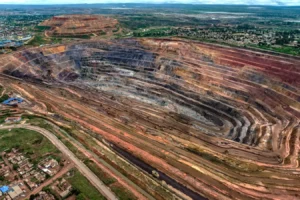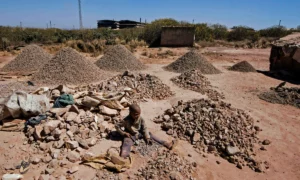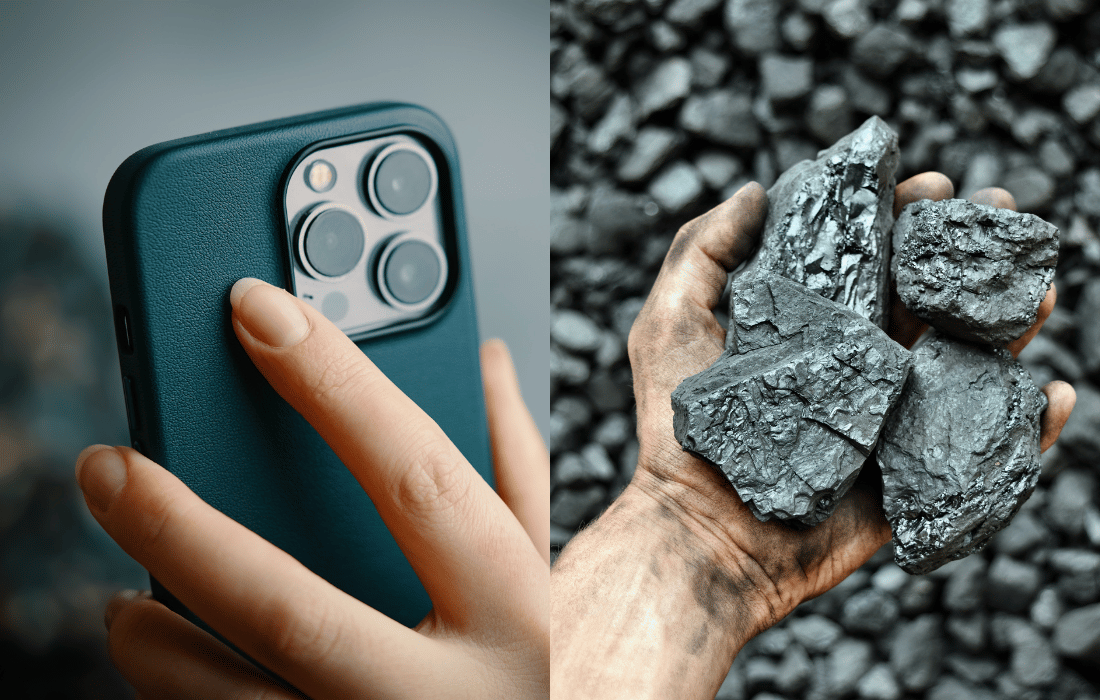In a world where smartphones, electric vehicles, and renewable energy solutions dominate the horizon, it’s far too rare that we stop to think about what powers all this innovation. At the heart of this technological revolution lies cobalt – a rare and invaluable metal. But as Siddharth Kara’s groundbreaking book Cobalt Red: How the Blood of the Congo Powers Our Lives reveals, the story behind cobalt is far from one of progress and innovation. Instead, it is a horrifying modern-day example of human exploitation and environmental devastation.

Kara’s work sheds much-needed light on an issue often ignored by mainstream media, a feat further amplified by his appearance on The Joe Rogan Experience. This platform, with its vast reach, brought Kara’s revelations to millions, making Cobalt Red a pivotal force in raising awareness about the grim realities of cobalt mining.
Let’s review the basics of the situation and what can be done about it.
Cobalt as The Backbone of Modern Technology
Cobalt is a critical component in lithium-ion batteries, the energy source that powers everything from smartphones to electric vehicles. Approximately 70% of the world’s cobalt supply comes from the Democratic Republic of the Congo (DRC), a nation rich in resources but plagued by poverty, corruption, and conflict.
The demand for cobalt has skyrocketed in recent years, driven by the push for green energy and sustainable technology. While this transition offers the potential for a brighter future, it comes with a significant hidden cost: the exploitation of some of the world’s most vulnerable populations and the destruction of their environment.
The Human Cost
In Cobalt Red, Kara takes readers into the heart of the Congo, where he documents firsthand the atrocities endured by cobalt miners. Many of these workers are children, some as young as six, who labor in unregulated mines under hazardous conditions.
Kara recounts stories of miners inhaling toxic cobalt dust, which causes severe respiratory illnesses. Many work without proper safety equipment, risking cave-ins and other deadly accidents. For their backbreaking work, they earn just a few dollars a day, barely enough to survive.
By weaving personal stories into his narrative, Kara humanizes the statistics and brings the stark realities of cobalt mining to life. These accounts are a sobering reminder that the devices we use every day come at an unimaginable human cost.
The Environmental Toll of Cobalt Mining
The consequences of cobalt mining extend far beyond human suffering. The

extraction process wreaks havoc on the environment, leading to deforestation, soil erosion, and the contamination of water sources with toxic chemicals.
Kara describes how rivers and streams near mining sites become polluted with heavy metals, endangering both local communities and wildlife. The long-term impact of this environmental degradation is irreversible, threatening the livelihoods of those who depend on the land and water for survival.
The Paradox of Green Technology
One of Cobalt Red’s most striking themes is the paradox green technology presents. Electric vehicles and renewable energy systems are often vouched for as the solution to climate change. Yet, as Kara points out, these technologies are built on a foundation of exploitation and environmental harm.

This paradox raises uncomfortable questions about the true cost of sustainability. How can we claim to build a greener future while destroying lives and ecosystems in the process? Kara challenges readers to confront these contradictions and demand a more ethical, and holistically considerate, approach to technological innovation.
A Voice for the Voiceless
Siddharth Kara deserves immense credit for his pursuit of truth; undoubtedly putting his life at risk to do so. Through Cobalt Red, he has given a voice to the voiceless and brought global attention to an issue that is often overlooked. His appearance on The Joe Rogan Experience was particularly impactful, introducing his work to millions of listeners and sparking widespread conversation about the ethics of cobalt mining.
Kara’s efforts underscore the power of investigative journalism in driving change. By exposing the harsh realities of the cobalt industry, he has publicly challenged corporations, policymakers, and consumers to rethink their role in perpetuating this system.
What Can Be Done?
The revelations in Cobalt Red are a wake-up call for the world. But acknowledging the problem is only the first step. Addressing the human and environmental costs of cobalt mining requires a concerted effort from multiple angles.
- Corporate Responsibility:
Tech companies have to make sure that their supply chains are transparent and free from exploitation. This includes sourcing cobalt from ethical suppliers and investing in initiatives that improve the working conditions of miners.
- Policy Changes:
Governments and international organizations need to enforce stricter regulations on cobalt mining practices. This includes holding corporations accountable and supporting programs that provide alternative livelihoods for deeply exploited communities. - Innovation in Technology:
Researchers and engineers should prioritize the development of alternatives to cobalt or find ways to recycle cobalt from used batteries. These innovations could significantly reduce the demand for newly mined cobalt. - Consumer Awareness:
As consumers, we have the power to demand change by supporting companies that prioritize ethical sourcing and by spreading awareness of issues like those highlighted in Cobalt Red.
Rethinking the True Cost of Progress
Cobalt Red is more than just a book; it is a call to action. Siddharth Kara has laid bare the dark side of our technological advancements, challenging us to rethink the true cost of progress.
The next time you pick up your smartphone to tweet about global warming or drive your electric car, consider the journey of the cobalt that powers the devices that are becoming fundamental to our infrastructure. Behind every device lies a story of a

human being, and likely some sort of environmental sacrifice. It is up to us – corporations, policymakers, and consumers alike – to ensure that these stories lead to meaningful change.
By amplifying Kara’s message, we can take a step toward building a future that is not only sustainable but also just.









